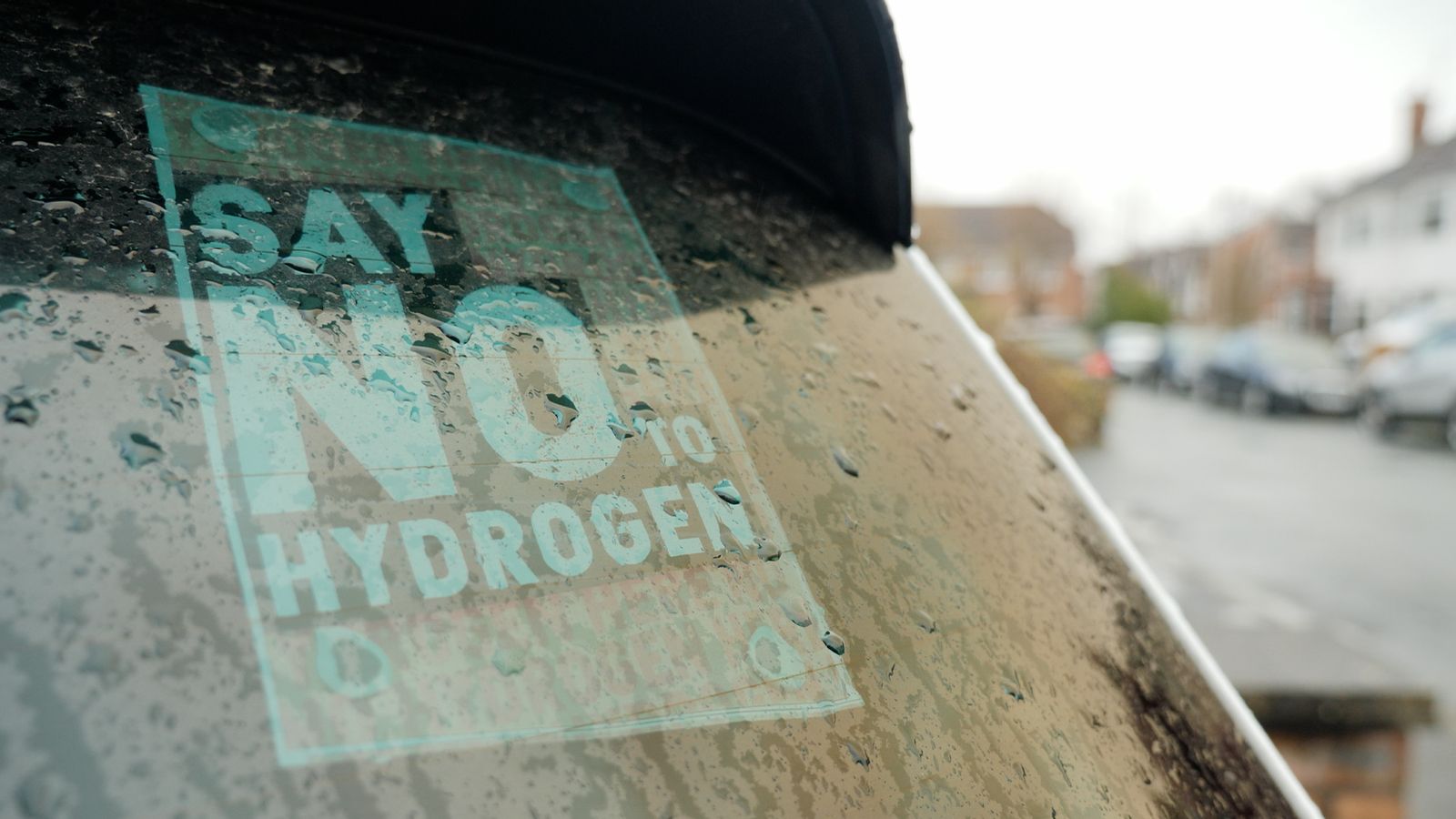Proposed ‘Hydrogen Village’ which could see homes swap gas for hydrogen
The proposed ‘Hydrogen Village’ in an area of Whitby would see 2,000 homes cut off from conventional gas and plumbed into hydrogen. While backers see it as an “oven-ready” replacement for gas, some residents raise concerns over safety.
Tom Heap
Climate presenter @tomheapmedia
Saturday 11 March 2023 02:38, UK
Say no to hydrogen poster
Why you can trust Sky News
You know a change has hit the real world when you see protest posters about it.
But ‘Say no to Hydrogen’ flyers plastered in suburban bay windows seem a little bizarre.
How can you be against an element, especially the most abundant one in the universe? When it’s being pushed on you and your much loved home.
At least that’s the perception of some residents in Whitby, a neighbourhood of Ellesmere Port in Cheshire, like Keith Lewington.
“I think it is an absolute disgrace, we’ve been offered up on a plate to the oil and gas industry,” he says.
The ‘Hydrogen Village’ proposal is for 2,000 homes here to be cut off from conventional gas and plumbed into hydrogen.
It’s being developed by British Gas, the pipeline company Cadent and the local council as a pilot project to assess the suitability of hydrogen as a domestic energy source.
Three-quarters of British homes are heated with gas but it is a hydro-carbon – chemical formula CH4 – a fuel that emits carbon dioxide when it is burnt, contributing to global warming.
Keith Lewington
Image:
Keith Lewington
New homes built after 2025 have to be natural gas free.
Hydrogen, on the other hand, is totally carbon-free, can flow in pipes and can be used in boilers and cookers. Its backers, like Mike Foster from the Energy and Utilities Alliance, see it as an ‘oven-ready’ replacement for gas.
He says: “There will be no real change for people who are currently used to using natural gas. Housing stock will be populated with what’s known as hydrogen-ready boilers that can use natural gas now and at the point of conversion can be converted in situ in someone’s home. And then they just are using hydrogen in the same way as they’re using natural gas”.
EMBARGOED TO 0001 WEDNESDAY SEPTEMBER 21 File photo dated 25/08/22 of a thermostatic radiator valve. Retrofitting England's homes with good insulation and a heat pump could create millions of jobs and knock hundreds of pounds off the average household's bills, new analysis suggests. Issue date: Wednesday September 21, 2022.24:03
Play Video – Hydrogen for heating our homes
Hydrogen for heating our homes
But hydrogen has flaws.
Making it in a climate-friendly way uses electrolysis to split it from water – H20. But this is hugely energy hungry. To replace natural gas with hydrogen in UK homes right now would need nearly 30 times all the offshore wind power currently around Britain.
A report out this week from the Climate Change Committee, the independent government advisers on hitting our climate goals, doesn’t rule out hydrogen for home heating but comes close. David Joffe is their head of Net zero.
“It only has a small role to play,” he says. “The overwhelming majority of our decarbonised heating by 2050 is going to be in electrified form because we simply won’t be able to produce enough low carbon hydrogen for it to have a major role in the building sector.”
Whitby hydrogen village
Back in Cheshire, Keith Lewington and the anti-hydrogen campaigners also have safety concerns.
“We’re told we need to do this for our children and grandchildren. I don’t believe bringing your children or grandchildren into a house with such a volatile gas being fed into it is a very sensible thing to do at all. In fact, probably safer to keep them out,” he says.
Hydrogen is highly flammable and the molecule is so small that conventional gas pipework may not contain it without improvement. But natural gas can also be lethal.
Click to subscribe to ClimateCast with Tom Heap wherever you get your podcasts
A gas explosion is the working hypothesis as the reason behind the collapse of a three-storey building on the island of Jersey in December, which killed 10 people.
The main low-carbon alternative to hydrogen is heat pumps. These take whatever heat is present in the outside air and use pressure to raise that temperature. They need electricity to do this but you get around three times as much energy out as you put in.
Tom Heap hydrogen village vt
Residents in the ‘Hydrogen Village’ are to be offered heat pumps if they reject hydrogen when the natural gas is cut off.
But it does require a much more complex energy refit of the home and, critics say, it doesn’t fit well with older, poorly insulated homes which are plentiful in Britain.
Natural gas is the big beast of our home energy ecosystem. Making a clean break will be painful.






























